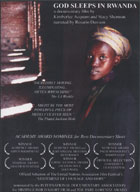
God Sleeps in Rwanda 2004
Distributed by Women Make Movies, 462 Broadway, New York, NY 10013; 212-925-0606
Produced by Kimberlee Acquaro and Stacy Sherman
Directed by Kimberlee Acquaro and Stacy Sherman
DVD, color, 28 min.
Sr. High - Adult
African Studies, Gender Studies, Holocaust and Genocide Studies, Human Rights, Political Science, Psychology, Sociology
Date Entered: 01/09/2007
Reviewed by Monique Threatt, Indiana University, Herman B Wells Library, Bloomington, INWinner of numerous awards, including an Oscar nominee for Best Documentary short, filmmakers Kimberlee Acquaro and Stacy Sherman deliver a haunting and compelling portrait of the 1994 Rwanda genocide, and its effect on five courageous women who inspire others to heal, repair, and look toward the future.
For 100 days between April and July 1994, the majority Hutus set out to ethnically cleanse Rwanda of its minority-empowered Tutsis. The plan is to first slaughter Tutsi men and boys, then women and young girls, and lastly a general massacre of all Tutsis. It is estimated that up to one million Tutsis and moderate Hutus are killed, and thousands of women and young girls raped, and infected with the HIV virus. The genocide is comparable to the Holocaust and Kosovo massacre. Ironically, the Rwandan Minister of Women and Family Affairs stands trial as the first woman to instigate a genocide using rape as a crime against humanity.
Narrated by actress Rosario Dawson (25th Hour, Alexander, Rent), the lives of Chantal Kantanga, Odette Mukakabera, Joseline Mujawamariya, Severa Mukakinani and Delphine Umutesi are profiles of courage and hope as they help to rebuild themselves and a wounded nation. As each one witnesses the death of family, friends and neighbors either through slaughter, torture, or the slow death of AIDS, their survival depends on their decision to empower themselves and others by openly speaking about HIV and AIDS, becoming community leaders, police officers, Head of Development, head of households, and landowners.
Prior to the genocide, a woman has little to no rights. She has no voice in politics or in her own home. Paradoxically, with a reduced male population, the genocide is forcing Rwanda to change its infrastructure to enact laws to empower women to become politicians, public orators, and businesswomen. These five women are reclaiming their lives and taking advantage of their newfound status as leaders in the village, and are changing the landscape to create a better and stronger Rwanda.
Still, not all is well. The psychological and sociological damage caused by any genocide is not fully known for many years to come, as evidenced by the high number of orphans, and the shame associated with being repeatedly raped. Yet, this documentary serves to empower and uplift broken souls. It forces all of us to see firsthand how the dehumanization of a people is turning into a positive change for economic and social freedom. Through a will to survive, these women are reclaiming their lives, and looking forward to building a brighter future for all Rwandans.
At the end of the film is a Rwandan proverb: “They say my country is so beautiful that although God may wander the world during the day He returns at night to sleep in Rwanda.” This proverb is undeniable as the cinematography captures a serene and beautiful landscape which makes it unimaginable to believe such atrocities could happen in this part of Africa. In addition to the wonderful cinematography, the music and technical aspects of the film are remarkable considering the filmmakers worked with little support to make the film a reality.
God Sleeps in Rwanda can be used to support African and gender studies, as well as studies to analyze the psychological and sociological cause and effects associated with genocide. In addition to this program, I recommend teachers, researchers and librarians consider previewing the following programs: Forsaken Cries: The Story of Rwanda (The Video Project), In the Tall Grass (Choices Video), In the Wake of War (Bullfrog Films), and Mother’s Courage, Thriving Survivors (National Film Board of Canada).
I highly recommend this film for High School, and academic media collections.
Awards:
- Oscar nominee for Best Documentary Short
- Audience Award Aspen Shortsfest
- Festival Award Ojai Film Festival
- Audience Award and Jury Special Mention Silverdocs
- Critic’s Choice Award Jackson Hole Docuweek
- Audience Award Palm Springs International Shorts Fest
- Official Selection Hawaii International Film Festival
- Official Selection of the United Nations Association Film Festival’s “Statement of Courage and Hope”
- International Documentary Association nominee for Distinguished Short Film and The Pare Lorentz Award